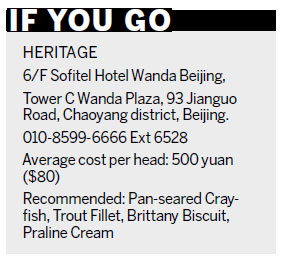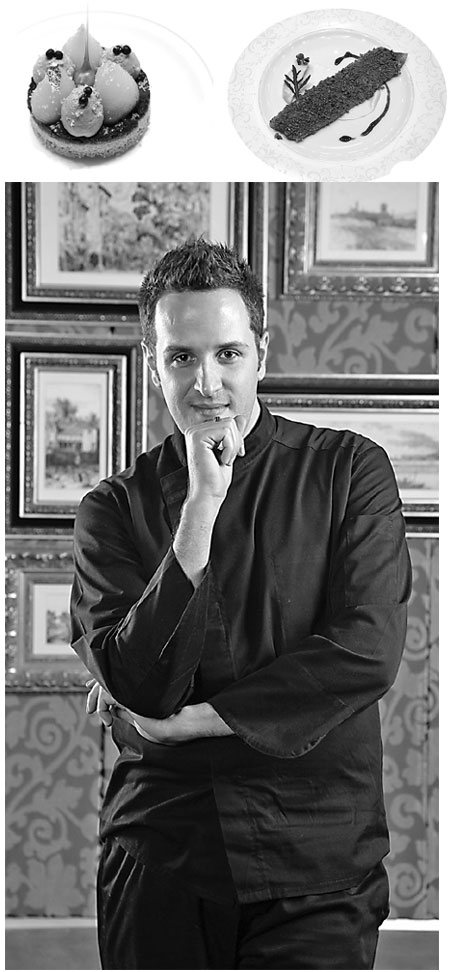Pursuing Perfection
Updated: 2013-01-06 08:38
By Ye Jun(China Daily)
|
|||||||
|
Top left: Brittany biscuit, praline cream, crunchy hazelnut and caramelized pear. Top right: The low-temperature trout fillet with hazelnut crumble. Photos by Ye Jun / China Daily Above: New chef de cuisine Michael Jakovljev at Heritage restaurant. Provided to China Daily |

It's a long hard road to culinary success if you want to go the Michelin-honored path, especially if you are young and eager. Michael Jakovljev shares his story with Ye Jun.
The new French chef de cuisine at Beijing's Heritage restaurant says the reason why he became a chef was because his grandmother had a restaurant, and he has a big family. "We always had big dinners and get-togethers. I enjoyed the pleasure of cooking and food," he says. At 30 years old, Jakovljev has recently become the new chef de cuisine at Heritage, previously Le Pre Le Notre, one of Beijing's best French restaurants. But when he first learned to cook, he was not very good.
"The first chef I met was very strict. He always said: 'You are not going to be a chef'," he recalls.
If that was bad, the worse was yet to come. At 17, Jakovljev went to his first Michelin-starred restaurant.
"It was my worst experience. We had a crazy chef who was always yelling," he says. "I went to the market at 7:30 in the morning, and worked 15 hours a day."
He began as the errand boy in the kitchen, and when his friends went to play, he had to work.
"If you don't have a passion for food, you cannot handle the pressure in Michelin-starred restaurants," he says, comparing a Michelin-star restaurant to military school. "You get less money, you work more, but you learn more."
In total, Jakovljev worked in five Michelin-starred restaurants, including the three-Michelin-star Hotel Le Mercure Europe, and the two-Michelin-star Les Trois Rois. One of the most important things he learned was precision.
"People pay money to get something different. It's perfection you try to reach. Dishes need to be consistent. Details are important," he says.
Jakovljev lists eight levels on the ladder from a commis to an executive chef de cuisine with each level taking about a year to complete. He became chef de cuisine at 26 years old.
"The best part of that learning process was to make the sauce, as a saucier," he reveals. "Because the sauce gives the taste, and makes the difference."
His secret in sauce making is good stock - good lamb reduction for lamb dishes, for example.
"For me, cooking stock is like making tea - you need to use the right bones, and good wine for wine sauce." Jakovljev makes just one liter of stock from 15 kg of bones, getting the marrow from the bones.
He says his inspiration comes from within and he does not copy anybody else.
Since he arrived in Beijing, he has been getting mixed feedback, although usually good reports, from customers.
"For example, the trout done at room temperature - it's different from what Chinese chefs do, but for me it is a good way to preserve the flavor," he says.
The dish is similar to a signature dish in his hometown, almond trout, but he adds his own twist with a crunchy roasted hazelnut crust. Also, the trout is originally poached, which for Jakovljev, is overcooking the fish.
"If you cook the trout in the pan, it becomes too dry," he says. So he cooks it at around 57 C, at room temperature, near the oven, with the help of a thermometer.
After 20 minutes, the result is a very tender, flavorful fish, with a texture different from any other traditional way of cooking.
Another skill he applies in the kitchen is vacuum cooking, for pork, lamb, duck, chicken and some fish dishes.
The chef defines his style of cooking as "time cooking" - a blend of flavors and textures based on seasonal products and modern cooking methods. The dishes are visually clean, with one base ingredient dominant.
It is a method that is becoming increasingly popular in Europe since its inception around 2002, and the chef thinks every fine-dining restaurant will be cooking like this in 10 years.
Jakovljev has only worked here for three months, but the young French chef is building his team and finding the things people want here.
One of the most obvious characteristics of Chinese diners is that they do not prefer desserts as sweet as the Europeans do.
"Sometimes I'm surprised when I do a dish I think is difficult for the Chinese to appreciate, but it's the opposite," he says. "Other times I think most people will appreciate something, but people don't like it so much. So we have to find the balance."
Jakovljev wants to offer dishes that are different, but he would not go too far out on a limb. Instead, he prefers to prepare food from traditional recipes, but in a modern style.
"I want diners to feel at home, just as staying in the kitchen with my team is like being at home."
Because, Jakovljev believes, it is not about a job, but about life.
Contact the writer at yejun@chinadaily.com.cn.
(China Daily 01/06/2013 page13)
